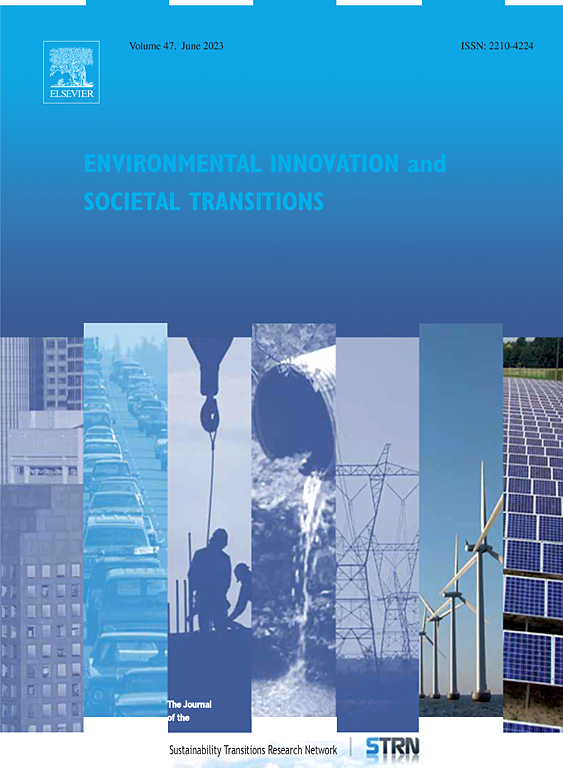数字经济能否有效促进清洁能源转型?来自中国的省级面板数据分析
IF 6.1
2区 经济学
Q1 ENVIRONMENTAL SCIENCES
Environmental Innovation and Societal Transitions
Pub Date : 2025-05-12
DOI:10.1016/j.eist.2025.101003
引用次数: 0
摘要
随着数字经济的快速发展和数字技术的普及,人们对清洁能源的数字化转型越来越感兴趣。基于此,本研究基于2000 - 2021年中国30个省份的面板数据,通过空间计量模型,从多维、多层次、多区域的视角探讨了数字经济对清洁能源转型的影响。实证表明,数字经济对地方清洁能源转型的积极作用远大于周边地区,进一步证明生态环境、技术创新、FDI、金融发展、城市规模和经济增长也是清洁能源转型可持续发展的主要行动路径。其次,在考虑政府干预和市场驱动的情况下,两者都限制了数字经济对清洁能源转型的积极影响,但数字经济的影响在不同地区有所不同。最后,考虑到空间区域异质性的存在,数字经济对西部地区的影响最大,东部地区最小,中部地区次之。我们的研究可以为中国和其他新兴发展中国家推动数字经济与清洁能源的深度融合提供理论支持,因为这些事实表明,数字经济的可持续发展是推动清洁能源转型的重要途径。本文章由计算机程序翻译,如有差异,请以英文原文为准。
Can the digital economy effectively contribute to the clean energy transition? A provincial panel data analysis from China
With the rapid growth of the digital economy and the spread of digital technologies, there is a growing interest in the digital transformation of clean energy. Accordingly, this study discusses the impact of digital economy on clean energy transformation from multi-dimensional, multi-level and multi-regional perspective through spatial econometric model based on the panel data of 30 provinces in China from 2000 to 2021. It is empirically demonstrated that the positive effects of digital economy on local clean energy transformation are much greater than those of neighboring areas, which further proves that ecological environment, technological innovation, FDI, financial development, city size and economic growth are also the main action paths for the sustainable development of clean energy transformation. Secondly, when government intervention and market-driven conditions are taken into account, both limit the positive impact of the digital economy on clean energy transformation, but the impact of the digital economy differs across regions. Finally, the digital economy has the largest impact in the western region, the smallest in the eastern region and the second largest in the central region, taking into account the existence of spatial regional heterogeneity. Our research can provide theoretical support for China and other emerging developing countries to promote the deep integration of the digital economy and clean energy, as these facts show that the sustainable development of the digital economy is an important way to promote the transformation of clean energy.
求助全文
通过发布文献求助,成功后即可免费获取论文全文。
去求助
来源期刊

Environmental Innovation and Societal Transitions
Energy-Renewable Energy, Sustainability and the Environment
CiteScore
13.60
自引率
19.40%
发文量
90
审稿时长
56 days
期刊介绍:
Environmental Innovation and Societal Transitions serves as a platform for reporting studies on innovations and socio-economic transitions aimed at fostering an environmentally sustainable economy, thereby addressing structural resource scarcity and environmental challenges, particularly those associated with fossil energy use and climate change. The journal focuses on various forms of innovation, including technological, organizational, economic, institutional, and political, as well as economy-wide and sectoral changes in areas such as energy, transport, agriculture, and water management. It endeavors to tackle complex questions concerning social, economic, behavioral-psychological, and political barriers and opportunities, along with their intricate interactions. With a multidisciplinary approach and methodological openness, the journal welcomes contributions from a wide array of disciplines within the social, environmental, and innovation sciences.
 求助内容:
求助内容: 应助结果提醒方式:
应助结果提醒方式:


